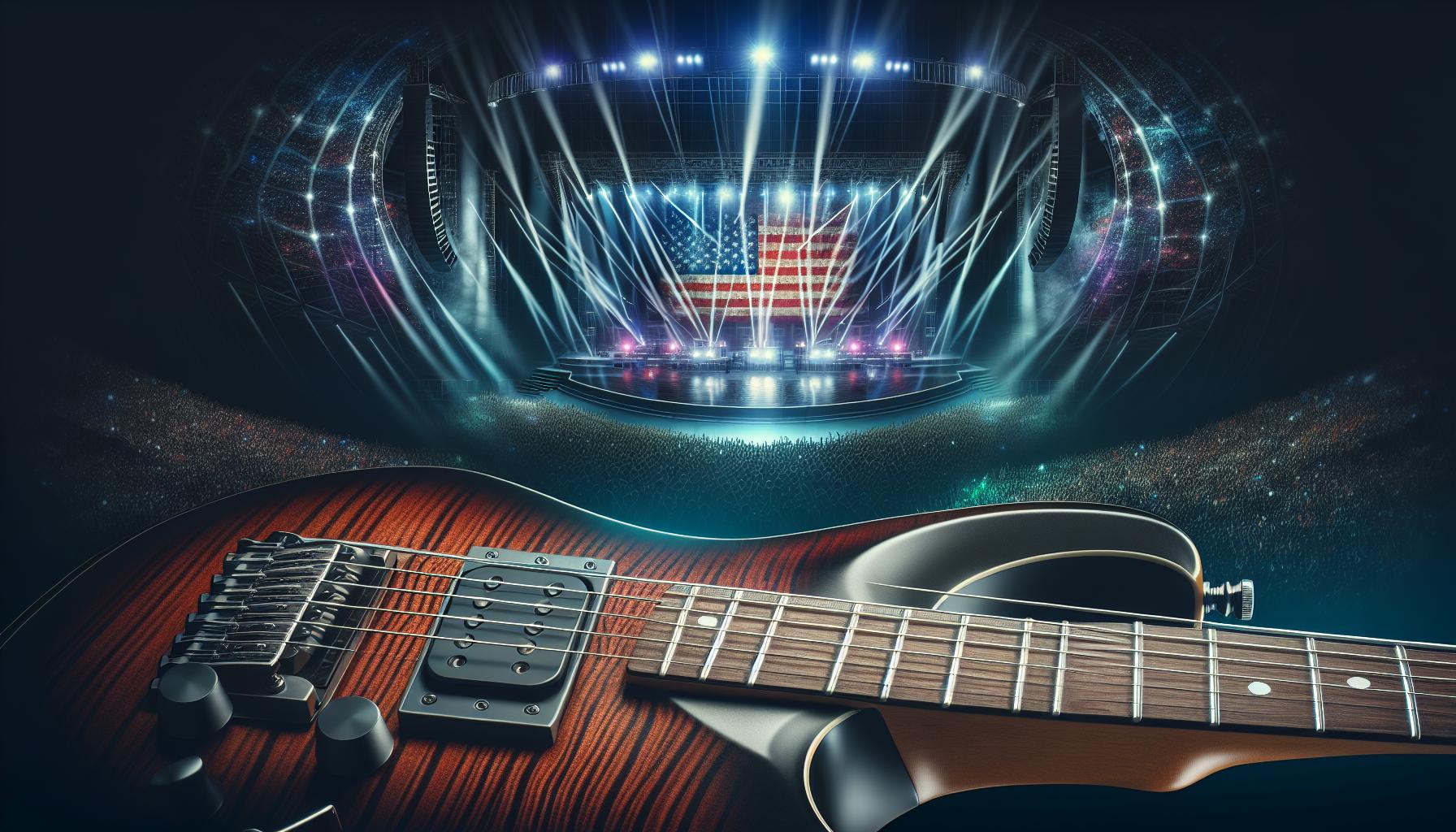The fusion of rock and rap has created some of the most dynamic sounds in music history. One band stands out for pioneering this blend by introducing the seven-string guitar into the mix. This unique instrument not only expanded the sonic possibilities but also influenced countless artists across genres.
As I dive into this topic, I can’t help but appreciate how the addition of that extra string transformed the way we experience heavy riffs and intricate melodies. It’s fascinating to see how one band’s innovation reshaped the landscape of rock-rap, pushing boundaries and inspiring new generations of musicians. Let’s explore which band made this groundbreaking move and how it changed the music scene forever.
- Pioneering Fusion: Korn is credited with introducing the seven-string guitar into the rock-rap genre, transforming the sound and expanding musical possibilities.
- Influential Bands: Key groups like Limp Bizkit, Rage Against the Machine, and Linkin Park built upon Korn’s innovations, promoting the growth of rock-rap and its mainstream appeal.
- Extended Tonal Range: The seven-string guitar allows musicians to explore deeper tones and intricate melodies, enhancing the overall complexity in rock and rap music.
- Cultural Impact: Korn’s work has sparked creativity in countless other artists, influencing modern genres like metalcore and nu-metal, and establishing the seven-string guitar as essential in contemporary music.
- Historical Significance: The evolution of rock-rap dates back to the late 1980s, with roots in earlier genres, illustrating the collaboration potential across diverse musical styles.
- Legacy of Innovation: Korn’s groundbreaking approach left a lasting legacy, inspiring a new generation of musicians and ensuring the continued relevance of genre fusion in today’s music scene.
Which Band Brought the Seven-String Guitar into the Rock-Rap Style of Music?
The rock-rap genre emerged through the blending of rock’s aggressive energy with hip-hop’s rhythmic complexity. This evolution opened doors to innovative sounds and diverse collaborations.
Origins of Rock-Rap
The roots of rock-rap trace back to the late 1980s when artists began merging rap with rock influences. Groups like Run-D.M.C. showcased this fusion with tracks like “Walk This Way,” featuring Aerosmith. This collaboration paved the way for future artists to explore varied musical landscapes. The seven-string guitar, introduced by bands like Korn in the mid-1990s, added depth and grit to this genre, enhancing its appeal.
Key Influences in the Genre
Influential elements shaped rock-rap’s trajectory.
- Korn: Pioneered the use of the seven-string guitar, creating heavy riffs and unique sonorities.
- Limp Bizkit: Blended aggressive vocals with rap-infused lyrics, becoming central to rock-rap’s popularity.
- Rage Against the Machine: Incorporated political messaging into their music, combining rap verses with powerful guitar work.
- Linkin Park: Mastered the balance between rap and melodic rock, contributing to the genre’s mainstream success.
These groups set the stage for future musicians, solidifying rock-rap as a distinctive style with broad appeal.
The Introduction of Seven-String Guitars

The seven-string guitar debuted in the 19th century, primarily used in jazz and classical music. Its entrance into rock-rap marked a significant shift, enhancing musical diversity and complexity.
Brief History of the Seven-String Guitar
The seven-string guitar originated in the 1700s, with its design evolving through the years. By the 19th century, it gained popularity in Eastern European folk music. Jazz musicians, like George Van Eps in the 1940s, expanded its use by incorporating it into their compositions. The rock genre saw its first significant adoption in the late 1980s, with manufacturers producing models tailored for heavier musical styles. Korn brought it into the mainstream in the mid-1990s, using it to create heavy, downtuned riffs that differentiated their sound from traditional guitar work.
Notable Features and Benefits
The seven-string guitar offers unique features that cater to various genres, particularly rock and rap. Key benefits include:
- Extended Range: The additional low string provides an extended range, allowing musicians to explore deeper tones and complex chord formations.
- Versatile Tunings: Musicians can use various tunings, expanding creative possibilities. This versatility supports heavy riffing and intricate melodic lines.
- Enhanced Tone: The broader string set allows for richer harmonics and tonal depth, contributing to heavier soundscapes.
- Increased Chord Options: The extra string offers a wider array of chord voicings, facilitating innovative compositions and arrangements.
These features have made the seven-string guitar an essential tool for artists pushing the boundaries of genre fusion, solidifying its place in rock-rap and beyond.
The Band That Pioneered the Sound

Korn stands as the quintessential band that integrated the seven-string guitar into the rock-rap genre. Their unique sound not only influenced countless artists but also reshaped the musical landscape in the mid-1990s.
Overview of the Band’s Formation
Korn formed in 1993 in Bakersfield, California. The original lineup included Jon Davis, James “Munky” Shaffer, Brian “Head” Welch, Fieldy, and David Silveria. Their diverse backgrounds in punk, metal, and hip-hop combined to create a distinctive style. Early performances showcased their raw energy, fostering a dedicated fan base and setting the stage for their future success.
Key Albums and Milestones
Korn released their self-titled debut album in 1994, which marked a pivotal moment for rock-rap. The album featured heavy riffs and experimental sounds that captivated audiences. The 1996 follow-up album, Life Is Peachy, solidified their status in the scene. However, it was on the 1998 album Follow the Leader that Korn fully embraced the seven-string guitar, utilizing it to craft deeper, heavier riffs that resonated with fans. Their collaborations with artists like Ice Cube and the band’s innovative approach contributed to the genre’s evolution, elevating it to mainstream success.
Impact on the Music Scene

The fusion of rock and rap, spearheaded by Korn’s groundbreaking use of the seven-string guitar, significantly altered the music landscape. This change not only defined a new genre but also paved the way for countless artists to explore innovative sounds and styles.
Influence on Other Bands
Korn’s pioneering use of the seven-string guitar sparked a wave of creativity among other bands in the rock-rap genre. Following Korn’s lead, groups like Limp Bizkit embraced the instrument, incorporating heavy riffs and complex rhythms into their sound. This trend equipped artists with the tools to experiment with lower tunings and aggressive playing styles, helping to forge a distinct identity in rock-rap music. Bands such as Slipknot and Deftones also adopted elements of Korn’s sound, blending genres and advancing the heavy music scene. These artists built upon Korn’s foundation, resulting in an expanded genre that reached new audiences and influenced an entire generation of musicians.
Legacy in Modern Music
Korn’s introduction of the seven-string guitar solidified its place in modern music, inspiring new artists and shaping the evolution of various genres. Contemporary bands like Bring Me the Horizon and Architects continue to utilize the instrument, demonstrating its versatility and significance in crafting innovative sounds. The impact of Korn’s innovations has extended beyond rock-rap, touching genres such as metalcore and nu-metal, where heavy guitar work remains central. Korn’s legacy continues to thrive, as their stylistic choices and approach to genre fusion influence a wide range of modern artists, ensuring that the seven-string guitar remains a staple in today’s music scene.
Korn’s groundbreaking use of the seven-string guitar truly reshaped the rock-rap landscape. Their innovative approach not only set them apart but also paved the way for future artists to explore new sonic territories. I admire how they blended heavy riffs with intricate melodies, creating a sound that resonates with fans even today.
The influence of Korn’s style is evident in the music of countless bands that followed. This legacy continues to inspire modern musicians who push the boundaries of genre fusion. The seven-string guitar remains a vital instrument in this evolution, proving its worth across various genres. It’s exciting to see how Korn’s contributions have left an indelible mark on the music scene.

